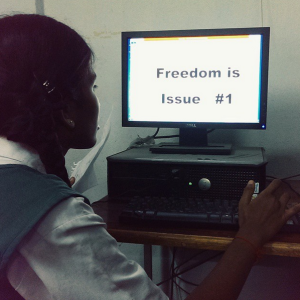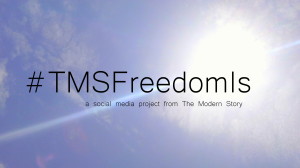MGM Magazine: Freedom Is…
As mentioned in a previous post, the students at MGM Government Girls High School in Nampally focused on freedom for their final documentary.
Though it was already an ambitious undertaking, the students had the energy and interest to go further and create something more. We talked a lot about how family and community often dictate what freedom means for girls, even for things as simple as whether they are able to walk outside at night or wear jeans. We discovered that freedom is a nuanced topic, especially for girls. Sometimes they wanted more freedom, other times, they felt that what their family, religion, or community dictated was okay. Regardless, they all mentioned that they don’t have this conversation often with their community.
One big part of the final stage of The Modern Story curriculum is a community service project. Previously, classes have done community outreach about dirty water, a clothing drive, and an activist art project that featured a portrait of the city’s sanitation manager made out of trash. For my MGM students, I thought that something that spoke to their work and their needs would be the most appropriate project.
So we decided to make a magazine so the girls could continue the conversation about freedom at home. Using the one working computer in our classroom, I set up a team to do the layout of the magazine on Word processing and tasked them with interviewing their classmates about freedom, taking portraits, and typing up the answers. Most people wouldn’t be thrilled about typing for 60 minutes straight, but these girls jumped at the task. They learned how to change the font, make columns, and import a photo. Simple skills, but fundamental ones that can further their future media production.
They also showed off their interview and editing prowess, deciding on which questions to ask about freedom and which photos to use. Some answers are simple, others are profound. But it did provide an array of answers the help continue the conversation.
Once we finished the basic layout with interview questions and photos, I added quotes the students got from interviewing a local NGO, and extra photos from a portrait/photography project the students also spearheaded.
After a long (and pricey) night at my second home aka the photocopy shop with my now good friend Hamesh, we had 30 shiny bright copies of the first issue of MGM Magazine for each student to take home, as well as copies for the headmistress and a few teachers.
I hope the conversation continues at home, but if nothing else I am very happy these students have a physical copy of their hard work to show off to their families and communities.
And thanks to Issu, you can check out the digital copy of their magazine below! Enjoy and share their work!


